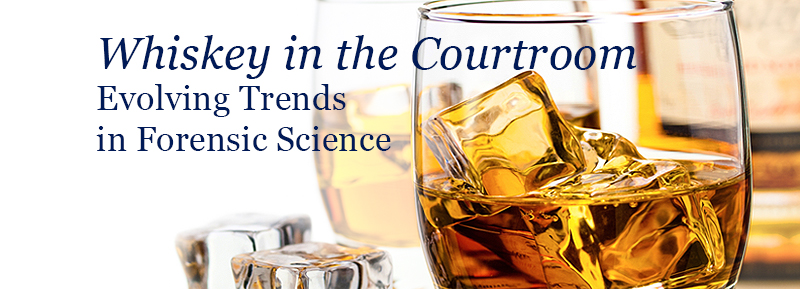2015 Symposium: Whiskey in the Courtroom

When: March 20, 2015
Location: Duke Law School
Anticipated 5.25 hours of North Carolina CLE credit.
No registration fee, but participants will be billed $3.00 per CLE credit hour by the NC State Bar.
This event was a great success! Thanks to all who participated and attended.
Symposium Co-sponsors


Tentative Agenda
The following agenda is subject to change.
10:00 – 11:15Poster Session and Registration
The Poster Session provides attendees an opportunity to meet with a number of forensic scientists and other experts from different disciplines – including fingerprints, DNA, toxicology, and digital evidence. Participants will have the opportunity to speak one-on-one with experts to gain a general understanding of the state of the disciplines and/or have specific questions answered.
11:15 – 12:00Keynote: Whiskey in the Courtroom – Sleep Deprivation and Decision-Making
Presenters:
- Theresa Newman, Clinical Professor of Law, Duke Law School
- J.H. Pate Skene, JD, Ph.D., Associate Research Professor, Duke Institute for Brain Sciences
Resources: The Application of Sleep Deprivation Research on Jury Deliberation
The title of the session – “Whiskey in the Courtroom” – is taken from a late 19th Century North Carolina case in which the verdict was overturned because the jury had been drinking whiskey during deliberations. Focusing on sleep deprivation – the new “whiskey in the courtroom”? – Professor Theresa Newman and Professor Pate Skene will address how an evolving understanding of science and medicine may provide a new perspective in a criminal case – and a new opportunity to challenge certain evidence and/or a conviction. Where should lawyers look for new scientific information that may be relevant to their cases? When they find new scientific information that calls into question the reliability of evidence or a verdict, how should they raise the issue? What are some litigation strategies that can be employed to get courts to consider new scientific evidence?
12:00 – 1:30Child Sex Abuse Cases – Understanding Child Medical Examinations and Working with Medical Experts
Presenters:
- Cynthia Brown, MD, Mission Children’s Hospital
Resources: Child Sexual Abuse-Update on Medical Aspects,
Sexual Abuse Update References
Adams Classification 2015 Update - Lisa Miles, JD, Miles & Montgomery Law Firm
- Mark Montgomery, JD, Miles & Montgomery Law Firm
Resources: Expert Testimony in Child Sexual Abuse Cases and Go-By Motions
Dr. Cynthia Brown will explain how child medical exams are performed in cases of suspected child abuse, what standards should be followed, and what medical findings may be mistaken for signs of trauma. She will also discuss recommendations for finding experts willing to work for the defense on these cases, and will identify what medical records attorneys should be provided to defense attorneys through discovery. Attorneys Lisa Miles and Mark Montgomery will offer recommendations for working with state’s and defense experts in cases of suspected child abuse. They will identify potential areas for cross-examination of experts and other litigation strategies for cases involving medical experts.
1:30 – 1:45BREAK
1:45 – 3:15Using Cell Tower Evidence to Determine Suspect Location: Phone Records and StingRay Devices
Presenters:
- Larry Daniel, Digital Forensics Certified Practitioner, Guardian Digital Forensics
- Lars Daniel, Certified Digital Forensic Examiner, Guardian Digital Forensics
Resources: Cellular Analysis for Legal Professionals - Nathan Wessler, Staff Attorney, American Civil Liberties Union
Resources: Stingrays-Guide for Defense Attorneys; Amicus Brief-Carpenter
Amicus Brief-Perry
Law enforcement officers claim to be able to place suspects at crime scenes using information in cell phone records about a cell phone’s connection to a particular cell tower. Location information can also be stored in a suspect’s phone. Speakers Larry and Lars Daniel will discuss how reliable this data is and explain its limitations. They will also explain how StingRay devices are used by law enforcement to locate suspects and develop investigatory leads. StingRay devices act as a fake cell tower, causing phones in their vicinity to connect to the device, which provides law enforcement with information about what cell phones are in the area. These devices are used without a warrant, and if a court order for their use is sought, the order is sealed, making it difficult for attorneys to determine whether the device has even been used in a case. Speaker Nathan Wessler will discuss the legal implications of law enforcement's use of these devices and challenges that have been made to orders for cell phone companies to turn over subscriber cell phone records without a warrant.
3:15 – 3:30BREAK
3:30 – 5:00Functionality and Limitations to Fingerprint, DNA, and Firearm Databases
Presenters:
- Jason Howe, MS, JD, Certified Latent Print Examiner, Roxboro Police Department
Resources: Fingerprint Databases - Max Noureddine, Ph.D., Molecular Geneticist, ForensiGen, LLC
Resources: The Basics of Combined DNA Index System - Peter Ware, Forensic Scientist Manager, NC State Crime Laboratory
Databases allow law enforcement to develop leads to previously unknown suspects based on fingerprint, DNA, or firearm evidence. Speaker Jason Howe will discuss how local and national fingerprint databases work. What role do fingerprint examiners have in determining which fingerprints are searched in these databases? If an item of evidence has not been tested, can defense attorneys have it tested and any prints entered in these databases? Can error be associated with database matches? Dr. Max Noureddine will discuss local DNA and CODIS databases. What are the requirements to upload DNA profiles to these two databases? What is the likelihood of a false positive match? Can defense attorneys have items of evidence tested for DNA and uploaded to these databases? Speaker Peter Ware will explain the use of firearm databases in forensic cases.
3:30 – 5:00Functionality and Limitations to Fingerprint, DNA, and Firearm Databases |
||
|
Presenters: |
||
| Jason Howe, MS, JD, Certified Latent Print Examiner, Roxboro Police Department | ||
| Resources: Fingerprint Databases | ||